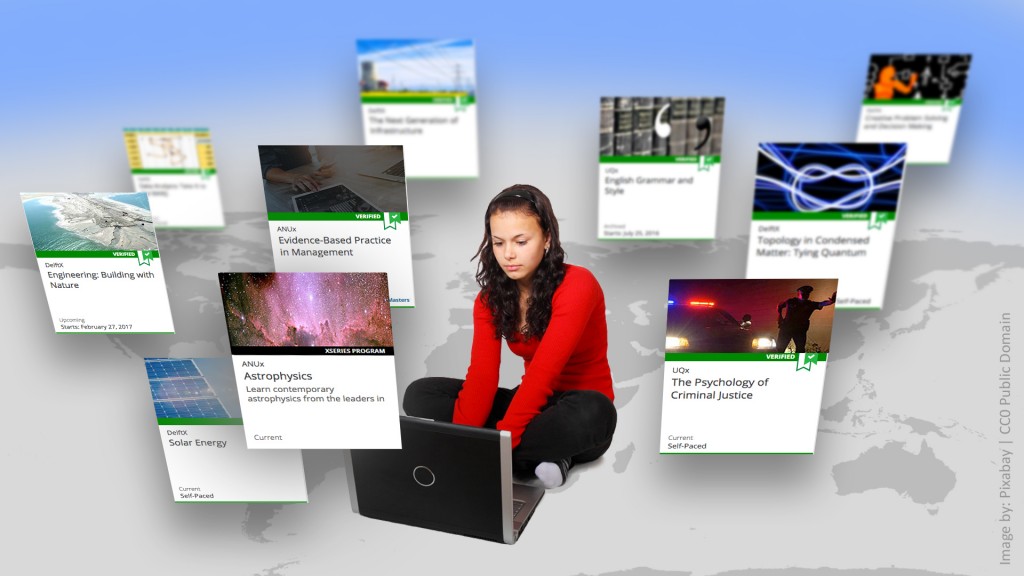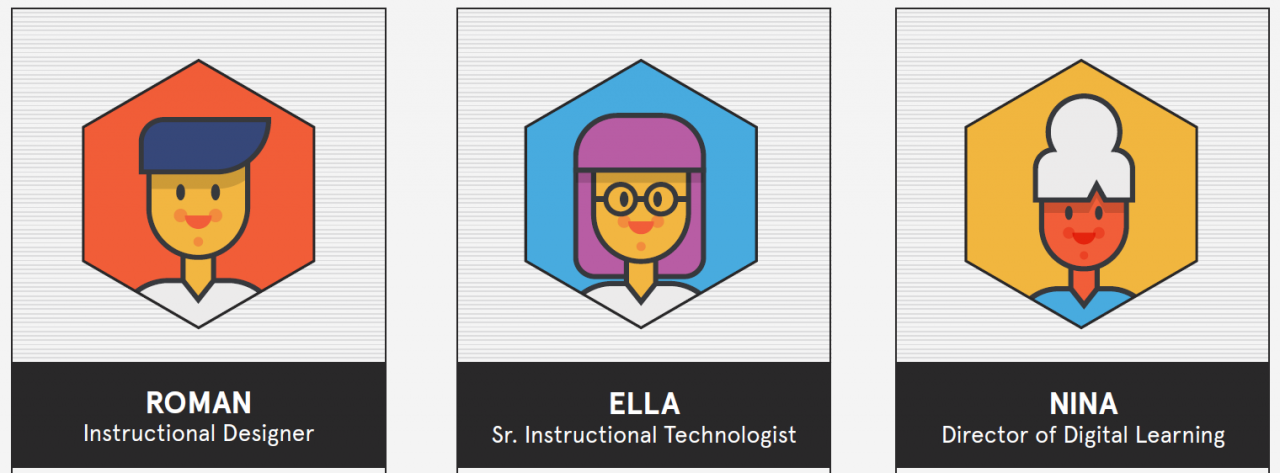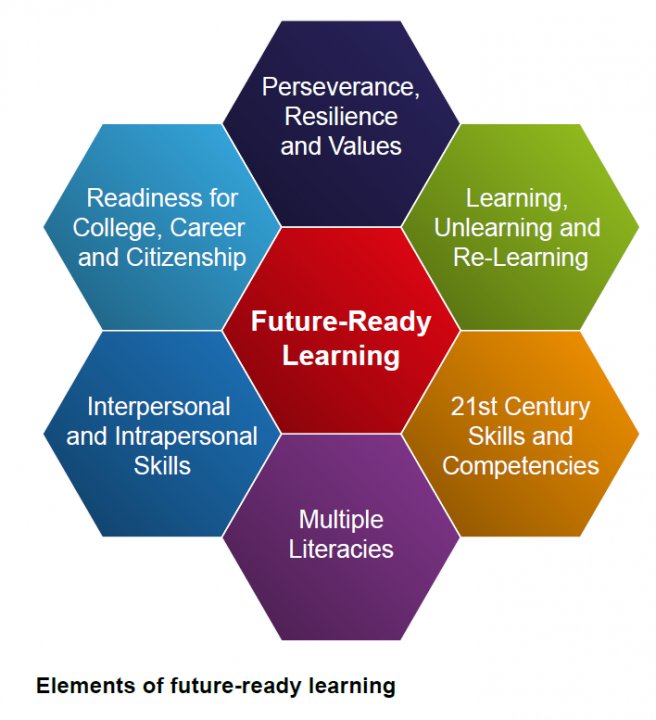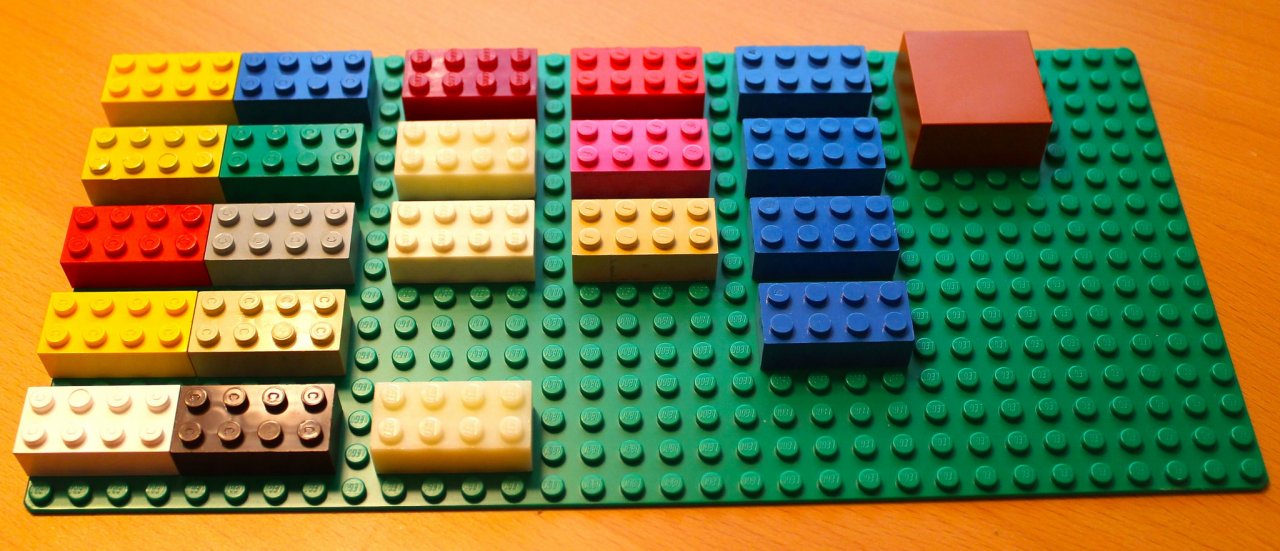Educause has released an interesting video of the student of the future. In my opinion they give a good overview of developments in the technology and the diversity of our learners.
Category: "Online Learning"
A week ago TU Delft launched their first MicroMaster programme. The topic is about Solar Energy Engineering. This programme is part of the announcement of 16 new MicroMaster programmes on the edX platform.
What is a MicroMaster?
It is a series of MOOCs, which allow learners to specialise in a certain topic and advance their careers or studies. It can be finished with a certificate and may be counted towards a regular master programme after admission. With MicroMasters programs, we are helping to bridge the knowledge gap between higher education and the workplace by offering content and credentials in the most in-demand fields and skills needed for success in today’s rapidly-evolving and tech-driven world. These credit-eligible, career-relevant programs are free to try, and can help advance careers and offer a pathway to an accelerated Master’s program.
Solar Energy Engineering
Our online solar energy MicroMaster programme includes four rigorous courses and a practical project derived from TU Delft’s Master of Science programmes. The workload is around 18 EC (European Credits). It will provide learners with most of the technical knowledge they need – from the physics of photovoltaic solar cells to the design of microgrids. But the MicroMasters programme offers more than that – it will lead to a valuable MicroMasters credential when finishing all courses and the project successfully. For prospective students who apply and get admitted to specific TU Delft Master of Science programmes, it will allow them to use the MicroMasters credential to request an exemption for the equivalent solar courses (depending on their Individual Exam Programme).
Demand from industry
The renewable energy market develops rapidly. It is our university’s mission to contribute to solving tomorrow’s problems and that includes supporting the transition to renewable energy through research and education. Providing education to professionals in the solar energy sector is one way of doing that. In line with our approach to lifelong learning, we hope to close the knowledge gap for engineers and other professionals who desire to develop their expertise with this MicroMaster Programme on solar energy.
In the first week already more than 4,000 learners enrolled in the first course that starts on April 24th.
The TU Delft has decided to use the opportunity of implementing a new LMS to innovate education towards blended and online education. A two-year project was defined to innovate education during the migration to the new Collaboration and Learning Environment (CLE) Brightspace. An important part of this project is to provide excellent technical and didactical support to our academic staff.
As Learning Developer you will be part of the (international) CLE migration and implementation team. This team is responsible for the successful transition to the new LMS Brightspace. The primary focus of the project is to improve campus education, not just move content from the old system to the new CLE.
The focal areas of a learning developer at the TU Delft are:
- Design instructional materials and courses, particularly for digital delivery.
- Manage the efforts of faculty, administration, other instructional designers, and others to achieve better student learning.
- Train faculty to leverage technology and implement pedagogy effectively.
- Support faculty when they run into technical or instructional challenges.
Course Migration Coordinator
This position will have a focus on managing the process of course migration and improvement. You will:
- Coordinate the activities of the other learning developers and student assistants.
- Meet with academic staff to discuss their educational improvements.
- Keep track of the progress of the course migrations and report to the project management.
- Coordinate with the other teams to align all activities towards the project's objectives.
Support Coordinator
This position focuses on the Support process of the transition. You will:
- Coordinate the activities of the support team that consists of student assistants.
- Have contact with academic staff to answer their support questions and resolve the didactical questions.
- Coordinate the development of support materials and manage the support website.
- Keep track of support questions and report to project management.
- Coordinate with the other teams to align all activities towards the project's objectives.
Do you want to be part of innovating education with a new Collaboration and Learning Environment? Join our international support team! Deadline is 9 January 2017, more information on our website.
Last Friday our Credits for MOOCs project opened for students. From this week on our students can join a number of MOOCs and get credits for them. There are no additional costs for them.
Expanding Portfolio
The first 12 MOOCs for credits will be provided by Ecole Polytechnique Fédérale de Lausanne (EPFL), University of Queensland, Australia National University and TU Delft and they will start in February 2017. During the summer a broader variety of courses will be made available by universities such as Hong Kong University of Science and Technology and Rice University. Other top 100 universities have said they are keen to join.
We started this project in the fall of 2015 and after many conference calls, presentations, meetings and hard work of my colleagues and our partners we have managed to open it for enrolments. When MOOCs are infiltrating the university curriculum you have to pass many hoops and bypass many obstacles.
Our students can find all the information about the process and which MOOCs are offered on this website.
Assessment
One important aspect is that we asked all the instructors of the MOOCs under what conditions they would offer credits for their MOOCs. For most MOOCs this means that there is an additional assessment requirement. That can be like a proctored exam, a skype interview, or a paper. This is also the reason why we have limited the number of students that can credits. Off course any learner can enroll in these MOOCs.
Virtual Exchange
All current exchange programmes are based of students to temporary move to another city. A great opportunity for students, but for many not possible due to time or financial constraints. With this programme we created a kind of virtual exchange programme. Our students can do courses of other top universities from our campus in Delft. They can learn across borders.
I think this offers a great opportunity for our students. It offers them courses that we as a technical university don't offer and it gives them flexibility.
An interesting report of Intentional Futures on the role, workflow, and experience of instructional designers:
There are many technologies flooding the market that help foster innovative teaching and learning. These tools, such as learning management systems, lecture capture systems, simulation creators, authoring, and video and audio tools, have flooded into the classrooms and lecture halls of higher education. However, the inference that these innovative tools aid learning should not be immediately assumed. With faculties’ full work load, learning and implementing new and often complex tools to improve their online pedagogy isn’t a priority. In fact, as the needs and tools of institutions have evolved, instructional designers have positioned themselves as pivotal players in the design and delivery of learning experiences. Instructional designers exist to bridge the gap between faculty instruction and student online learning. But who, exactly, are instructional designers? What do they do? Where do they fit in higher education?
Their findings:
- Instructional designers number at least 13,000 in the U.S alone.
- They are highly and diversely qualified.
- Contrary to popular belief, they do more than just design instruction.
- Above all, they struggle to collaborate with faculty.
- One thing is certain: instructional designers are dedicated to improving learning with technology
I recognise their findings if I look at my team and their activities.
Highly and diversely qualified
What they name "instructional designer" we separated it in two different job titles:
- learning developer: focused on creating the learning design of a course (constructive alignment) and often acting as project manager
- instructional designer: expert in how to setup the learning design in the a specific platform (we have (open)edX, Blackboard and Brightspace.
All the learning developers have some form of educational science background. From a master in educational science to experience as lecturer with additional courses. The instructional designer have a much more technical background, one of my instructional designer is a watermanagement engineer. They all have finished a Bachelor and Master and some even have a PhD in education.
They do more than just design instruction
According to the report most instructional designers have four categories of responsibilities:
- Design instructional materials and courses, particularly for digital delivery
- Manage the efforts of faculty, administration, IT, other instructional designers, and others to achieve better student learning
- Train faculty to leverage technology and implement pedagogy effectively
- Support faculty when they run into technical or instructional challenges
The activities of my team perfectly aligns with 4 categories. Although sometimes they do even more, such as marketing, administration, policy advise.
Struggle to collaborate with faculty
With every course team an instructional designer has to win the trust of the faculty members. Faculty members are the experts on the topic of the course and have been teaching for many years. They have to accept that designing and delivering an online or blended course is a different cup of tea than classroom teaching. The instructional designer have been done this for many courses, so they know how to design an online course.
Dedicated to improving learning with technology
Despite the struggle with faculty they are always dedicated to make it work. Sometimes it means that the end result is not the best, but it was what could be reached within the time span and context of that course.
Recommendations
In the report there are a few recommendations. Two I want to strongly emphasize:
- Institutional leaders and administration - Involve instructional designers early, often, and throughout your technology transition. Develop clear standards that are expressed to all participants — institutional leaders, instructional designers, faculty, and students. Also, think about incentivising faculty to work with instructional designers from the get-go. Survey respondents made clear that they’d like more resources allocated to their work, which could have a high return on investment in terms of student success.
- Faculty - We know student success is top priority for you. An instructional designer can help you engage your students and give you more class time by using online tools. There is potential impact to be made for your students by collaborating and using new technologies that instructional designers can guide you to. They share your goal and want to see you shine for your students.
Since a couple of years the Open University creates an report about innovating pedagogy. Yesterday they published the fifth report. It is produced in collaboration with the Learning Sciences Lab at the National Institute of Education, Singapore, proposes ten innovations that are already in currency but have not yet had a profound influence on education.
The ten innovations they identified were rated on potential impact and in what timescale.
| Trend | Potential impact | Timescale |
| Learning through social media Using social media to offer longterm learning opportunities |
Medium | ongoing |
| Productive failure Drawing on experience to gain deeper understanding |
High | Medium (2-5 years) |
| Teachback Learning by explaining what we have been taught |
High | Medium (2-5 years) |
| Design thinking Applying design methods in order to solve problems |
Medium | ongoing |
| Learning from the crowd Using the public as a source of knowledge and opinion |
Medium | Long (4+ years) |
| Learning through video games Making learning fun, interactive and stimulating |
Medium | Medium (2-5 years) |
| Formative analytics Developing analytics that help learners to reflect and improve |
High | Medium (2-5 years) |
| Learning for the future Preparing students for work and life in an unpredictable future |
High | Ongoing |
| Translanguaging Enriching learning through the use of multiple languages |
Medium | Medium (2-5 years) |
| Blockchain for learning Storing, validating and trading educational reputation |
High | Long (4+ years) |
Reference
Sharples, M., de Roock , R., Ferguson, R., Gaved, M., Herodotou, C., Koh, E., Kukulska-Hulme, A., Looi, C-K, McAndrew, P., Rienties, B., Weller, M., Wong, L. H. (2016). Innovating Pedagogy 2016: Open University
Innovation Report 5. Milton Keynes: The Open University. ISBN 9781473022812
Image Credit CC-BY 3.0 licence Innovating Pedagogy 2016
Three weeks ago I attended the SURF Challenge Day. This day was organised to let suppliers show how their solution fitted with the SURF framework for flexible and personalised learning environment (in Dutch). 15 suppliers presented their solutions.
This framework is based on Educause Next Generation Digital Learning Environment. Both models use the metaphor of LEGO.
Personally I think that metaphor oversimplifies the process of a learner and it doesn’t help to solve the challenges that many universities face regarding their educational technology. A couple of reasons why it is flawed:
- Not all educational technology tools that are used as part of the learning experience are created equally, there is much more variety in the ‘bricks".
- Just sticking bricks together doesn’t make it a learning experience. The flow and interactive design are important.
- Accessibility is much harder to guarantee, especially if instructors can add their own bricks via LTI.
- Learning is much more complex.
We need to intelligently orchestrate all these different “bricks” to serve the student. In some situation it can just be as simple as IFTTT: if student has passed this quiz, he can go to the next chapter. But in many cases this process is far more complex than an IFTTT recipe of course, especially if you connect it to all the context. It is more like a central nervous system.
Photo Credit: CC-BY-SA Joe Miserendino
Next year there are elections in the Netherlands and political parties are already publishing their programmes. Due to the strict policy (budget cuts) and smart investments, government deficit has been reduced significantly. That means that there is money to spend and the different parties are claiming their priorities.
One of the priorities for many parties is more money for hiring more teachers in higher education. Although the workload of many teachers is high, I have my doubts if this will solve the problem.
Problem
Education is changing in higher education. One of the important changes is the digitization in education. I hear many universities and colleges say that blended education will be the default. This means that education will be a mix between classroom teaching and online learning.
This change means that the role of a teacher is changing, but also that more disciplines need to be involved to develop and run a course. Teaching has been a one man job for many centuries and I think it is time to rethink our perception on this
Course Teams
Education has become a complex balance between content, technology and pedagogy. It is very hard to find people that are subject matter expert, as well as tech-savvy as well as up-to-date on pedagogy (so no urban myths) and think about effective ways of examining learning outcomes - all at the same time. In addition, in most universities staff members also need to be researchers, grant experts, and (PhD) student supervisors. These are too many roles to ask of one person.
So we need to disperse these roles to a team of people, each with their own dedicated role and expertise.
In the last two years at TU Delft Extension School we have pushed that a teacher forms a course team to develop and run a course. The minimum for a course team is:
- Teacher: subject matter expert.
- E-learning developer: course design, assessment, constructive alignment.
- Student assistants: course builders, moderators.
Depending on the course objectives additional roles can be added. This is a list of the expertise we have in our support team to be added to the course teams:
- Assessment expert: digital testing is different from exams on paper.
- Graphic designer: create graphical elements, infographics.
- Multimedia expert: creating online videos, animations.
- Instructional designer: expert on how to technically implement your course in your platform.
- Copyright officer: to correctly use and reuse (open) content.
- Data Analyst: lots of data is generated that can be analysed and used to improve the course experience.
- Additional specialists for online labs, simulations, games, etc.
This approach has helped us to develop high quality online courses, but also lifted some of the burden from the shoulders of the teachers.
Conclusion: new perspective of teaching and support
Investing in extra teachers in higher education might seem like a proper way of spending extra budget. Investing in better course teams will have a much bigger effect to unburden teachers. Don’t invest in extra teachers, make existing teachers much more effective by properly supporting them. So better value for money!
Image Credit: CC-BY-SA Scott Maxwell
To tackle the challenges of providing top-level university education, Leiden University, Delft University of Technology and Erasmus University Rotterdam (LDE) have joined forces. Through this partnership three universities with complementary specializations create a world-class platform for educational research, innovation and training: the Centre for Education and Learning (CEL).
The LDE Centre for Education and Learning now seeks to appoint a Professor of Higher Education with a focus on teaching and learning processes in a digital environment. The Professor will be formally appointed at Delft University of Technology.
You will work closely with the online learning team of TU Delft, the Online Learning Lab of University of Leiden and project Online Onderwijs of Erasmus University Rotterdam.
Job Description
First, the chair covers the whole domain of higher education and includes the scientific reflection on research and theory development in the broad field of higher education. Subareas of higher education research and theory development include 1) students and their study success, 2) teachers and their teaching success, 3) learning environments for on-campus, online and blended teaching and learning, 4) special topics such as assessment, internationalization, diversity, and educational policy, and 5) teaching and learning in individual disciplines.
Second, the chair has a focus on teaching and learning in a digital environment, for instance online and blended forms of education followed by data analytics of these learning processes. New knowledge is to be created in this relatively new field of research. The three LDE universities are among the forerunners in this field and consider it of the utmost importance that these innovations are as much evidence-based as possible. The chair holder can rely and build on existing expertise within CEL and its pillars in the individual universities. It is expected that the chair holder brings the various researchers together and promotes knowledge exchange and joint knowledge creation. The research will enable evidence-informed university policy making, evidence-informed development of new university teaching projects, evidence-informed continuous professional training of university teachers, and will ameliorate teaching and learning theory.
More information on www.educationandlearning.nl/vacancy. The deadline for applications for this position is September 4, 2016.
This week I'm attending the EDEN annual conference in the beautiful Budapest. Nelson Jorge, Sofia Dopper and me wrote a paper about the TU Delft Online Learning Experience. This is a pedagogical model that supports the development of our courses and strives for increasing quality. The creation of the OLE was an important step for TU Delft, contributing to the development of online courses in a more systematic and consistent way, guiding all course development teams through the realisation of several shared educational principles.
At the Gala Diner of the conference we received the EDEN 2016 Best Practice Inititative Award for our paper. The award is not just for the paper but for the whole initiative of designing the model and implementing it for our courses. I see it as a great appreciation for the work we are doing with the TU Delft Extension School.
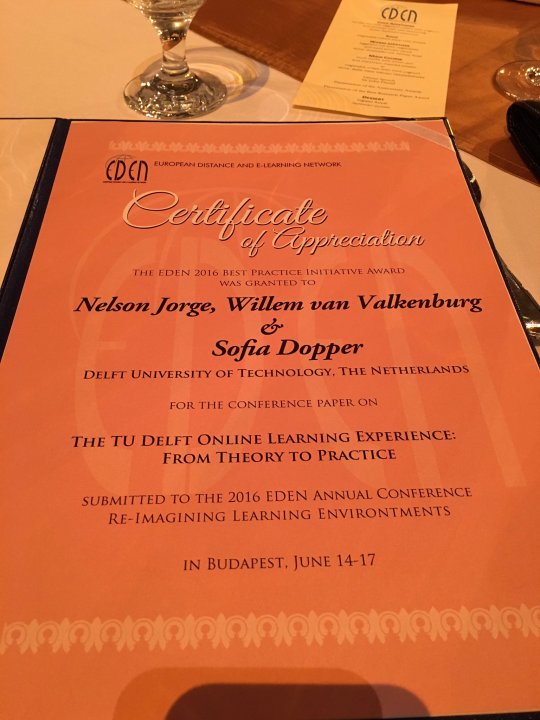
Online Learning Experience model
The OLE holds 8 principles to support course teams in the design and development of online courses. The model was elaborated based on the foundations established by distance learning experts (Moore, 1991; Keegan, 1996; Palloff & Pratt, 1999; Garrison, 2000; Peters, 2000; Anderson, 2003; Garrison & Anderson, 2003; Salmon, 2011; Salmon, 2013; Bates, 2015) and the know-how of the TU Delft Online Learning Course Development Team.
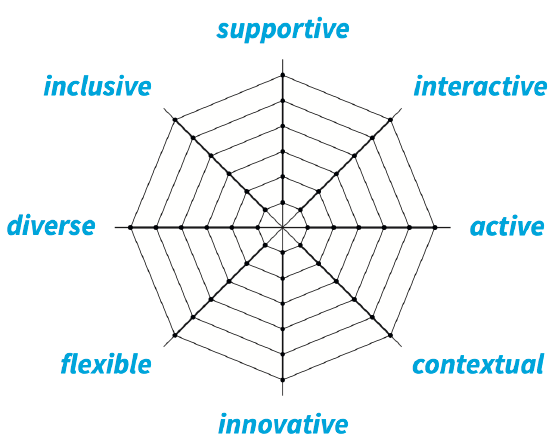
Paper
The paper is part of the conference proceedings of the EDEN 2016 conference. Here you can download our paper:
eden_2016_budapest_proceedings-tudelft-ole.pdf
Please reference:
- Jorge, Nelson; Van Valkenburg, Willem; Dopper, Sofia (2016). The TU Delft Online Learning Experience: From Theory to Practice in Teixeira, Szucs and Mazar (2016). Conference Proceedings EDEN 2016 Annual Conference. ISBN 978-615-5511-10-3. License CC-BY 4.0
Presentation
Here is the presentation Nelson presented at the conference.
And the link to the model explaining all the principles. Below is the video of teacher's perspective of Online Learning Experience


